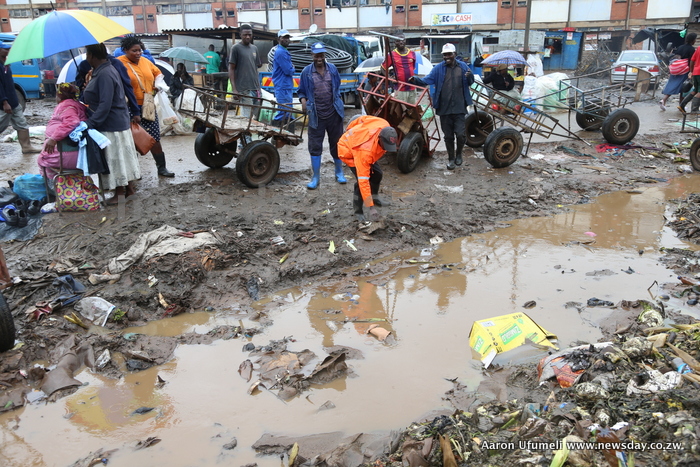By Bigboy Madzivanzira
The rapid urbanization of Zimbabwe’s cities has brought about numerous challenges, including a growing sewage problem. In many urban areas, sewage systems are overwhelmed, leading to blockages, flooding, and health hazards.
“It’s no longer the capital city we know,” said a visitor, remarking on the state of sewage in one city. “People are forced to live in unsanitary conditions, and it’s a breeding ground for diseases.”
The problem is further exacerbated by the city’s run battles with vendors in order to bring sanity to the once clean cities. Drainage systems are clogged with vegetable leaves, rotten tomatoes, and maize cobs.
Some of the contributing factors to this issue include:
– Aging infrastructure: Old pipes and sewer systems are more prone to breakages and blockages.
– Inadequate waste management: Poor waste disposal practices, including littering and dumping of waste in stormwater drains, can contribute to sewer blockages.
– Insufficient water supply: Low water pressure and intermittent supply can lead to sewer systems not functioning properly.
– Rapid urbanization: The influx of people moving to urban areas puts a strain on existing infrastructure, including sewage systems.
The consequences of poor sewage systems and drainage can be deadly. Every rain season, incidents of people drowning in sewers are common in Harare and other cities. This highlights the urgent need for investment in infrastructure and maintenance to prevent such tragedies.
To address this issue, a comprehensive approach is needed, including:
– Upgrading infrastructure: Investing in modernizing sewer systems and pipes to reduce breakages and blockages.
– Public education: Raising awareness about proper waste disposal practices and the importance of maintaining sewer systems.
– Improved waste management: Implementing effective waste management systems, including proper disposal of waste and regular cleaning of drainage systems.
– Increased investment in water supply: Ensuring a consistent and adequate water supply to support proper functioning of sewer systems.
Companies that manufacture products like Pampers can also play a role in addressing the issue. Some potential contributions include:
– Product design: Developing more environmentally friendly products, such as biodegradable or compostable diapers.
– Diaper recycling programs: Implementing recycling programs to reduce landfill waste.
– Public education: Educating consumers on proper disposal practices and promoting responsible waste management.
– Sustainable packaging: Optimizing packaging to minimize waste and using recyclable materials.
By addressing these factors and promoting responsible practices, Zimbabwe can work towards mitigating the public health risks associated with sewage in urban areas.
About the Author
Bigboy Madzivanzira is a Health Promotion Practitioner registered with the Allied Health Professions Council of Zimbabwe, a Medical Rehabilitation Practitioner registered with the Medical Rehabilitation Practitioners Council of Zimbabwe, and a Freelance Journalist accredited by the Zimbabwe Media Commission. He can be contacted on 0773367913 and Email healthpromotionclinic@gmail.com.
